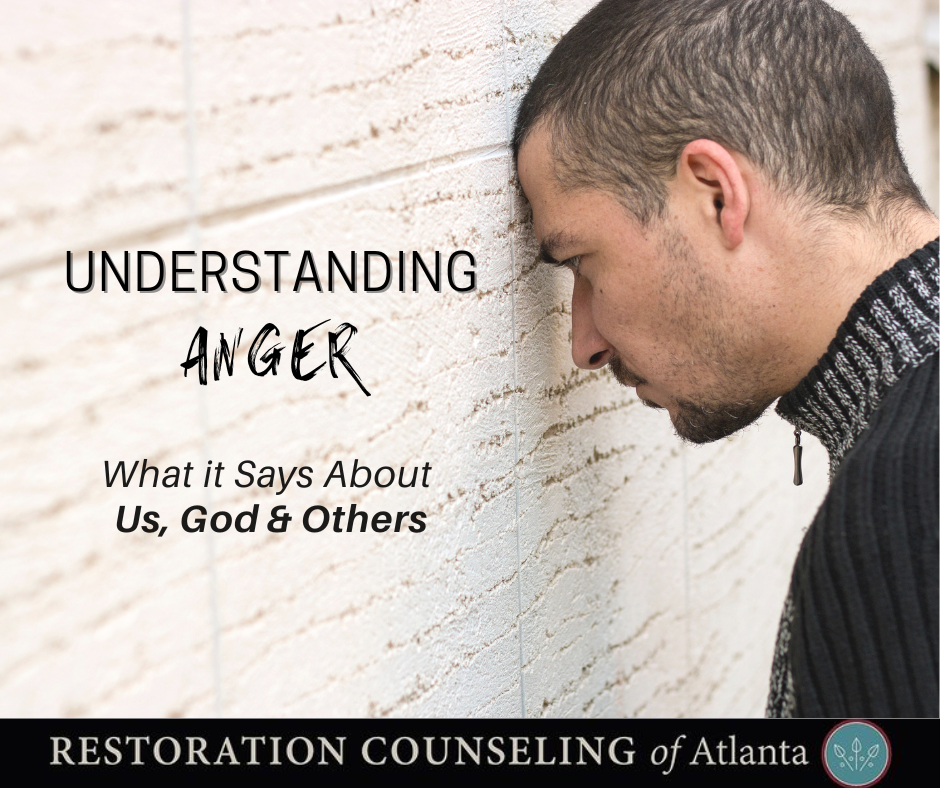What it Says About Us, God & Others
Genesis 4: 5-8; James 1:19, 20
Do you know anyone who did or said something in anger that was considered outside of their character? I’m sure we all have.
This article provides a broad overview that will define anger, provide insight into the development of anger, explore biblical descriptions of God’s response to anger, and describe how to transform anger into a productive process.
What is Anger?
Anger is, first and foremost, an emotion. Though often intense, it is neither positive nor negative. It is so often misused and misunderstood. Yet, it is a gift from God. Consider anger the check engine light of the soul that desires attention before we are consumed by it (Gen 4:5-8).
What is beneath the anger?
A common contributor to angry thoughts is frustration due to hopelessness, helplessness, being taken advantage of, or feeling out of control. Many are unaware that anger is a canopy that protects more vulnerable emotions, such as feeling insignificant, not good enough, or unworthy. However, this energy can be converted to motivation to seek justice or take action. On the other hand, it may be used to justify recklessness or enact vengeance.
These deeper beliefs fuel negative behavior and need to be discovered. Understanding is vital, but sadly, the true source often remains unexamined.
How anger is expressed?
The emotional continuum of anger ranges from:
Passive —> passive/aggressive —> assertive —> aggressive
- Passive – Deflecting, disengaging, or deferring the right to choose for one’s self to another directly or indirectly.
- Passive Aggression – An indirect expression of feelings (often accompanied by negative behavior) without direct communication with the person at whom the behaviors are aimed. These behaviors include but are not limited to being forgetful, critical, sarcastic, and cynical. Essentially the person’s lack of directiveness allows them to deny their intent of attempting to control or punish others.
- Assertiveness – Standing up for one’s rights without infringing on the rights of others. [2]
- Aggressiveness – Insisting on one’s rights with a lack of regard for others. [3]
The Origins of Anger in Your Life
I invite you to develop a healthy curiosity about discovering the origins. An individual’s upbringing is most likely where these behaviors are initially witnessed. Few individuals grew up in a home where anger and other emotions were healthily and freely expressed. Others experienced environments where emotions were unwelcome, suppressed, misplaced, or even manipulated.
Everyone should examine how anger was handled in their earliest memories. Growing up in a household with an overly aggressive parent might contribute to a lack of awareness of how one’s actions impact others. Without exploration and making new meaning, what is experienced in childhood might automatically become the default of adult behavior. These behaviors can show up seemingly out of nowhere in a relationship or on a job and wreak havoc.
Anger unchecked can be an anesthetic. It may numb an individual to the consequences of their behavior and cause the termination of something important to them. Aggressive behavior can move toward assertive behavior by asking others questions about how you are perceived. Seek to notice how anger affects those around you.
Take an emotional inventory.
An honest inventory of our emotions is necessary. Many might agree that in the U.S., among other places, disappointment is not handled well. The primary causes of negative behavior are likely dissatisfaction and hurt. Our souls long for comfort and satisfaction. An individual reacts because there is a need often not articulated to themselves, to another person, or to God.
Unmet expectations can drive emotions out of control as if on autopilot. Passive or passive-aggressive-oriented behavior can transition toward assertive behavior by naming those expectations. Express how another has injured you by using an “I” statement. Ex. “I felt ignored when you were scrolling on your phone while I was sharing about my day.”
Using a feelings wheel (a list of feelings that help you identify primary emotions of sadness, joy, fear, power, or anger) or talking to a therapist can help develop language and create a safe environment to express these needs and longings. But most importantly, pain should be expressed to the Lord.
What the Bible says about Anger and God
A quick keyword search of the Bible will yield several results for “anger” or “angry” that span across a majority of the books in scripture. Without diving into the specific context of each, a casual observer will notice that many thoughts reflect fear and/or panic. These thoughts accompany petitions to God to withhold his wrath, death, and destruction from his people, even if they were deserving of it.
God’s anger has a purpose in executing and preserving His righteousness. In the Old Testament, God is slow to anger, faithful, and merciful.[1] However, even some of the prophets felt that God was taking too long to deliver on His promises or punish the guilty. Have you ever felt that way?
You have a right to be angry.
If you have been mistreated, assaulted, cheated on, ignored, or abandoned, you should be angry. Paul issues the command to be angry but not to sin (Eph 4:26). James, the half-brother of Jesus, writes, “Know this, my beloved brothers: let every person be quick to hear, slow to speak, slow to anger; for the anger of man does not produce the righteousness of God.” (James 1:19, 20).
Feelings of anger beg to be satisfied but are often disproportionate to the offense. In other words, some people would want an offender punished longer and more harshly than the crime called for. The quest for vengeance is understandably an attempt to regain power or control from someone or something that has caused an emotional (or physical) injury.
An important question to ask is will my response produce the righteousness of God?
Trust that justice is with the Lord because he has withheld the punishment that humanity deserves and punished Jesus so that all can experience undeserved eternal life. Return good to others when evil is given.
God cares about us.
I invite you to read Genesis 4 in its entirety. God saw Cain’s despondent demeanor and pursued him with a path to make things right with God. The passage is generally described with a focus on how Cain murdered his brother (which is terrible and should not be overlooked). But the first offense was against God. Do we recognize that Cain needed a spiritual realignment? Do you realize that you need a spiritual realignment?
God welcomed Cain’s anger toward Him as he did with Moses (Ex. 32:31-32), David (2 Sam 6:6-8), and Jesus (Matt 27:46), to name a few. God can also handle your anger. Instead of turning inward and looking deeper as God invited him to do, Cain projected his rage outward and took the life of his brother. There were certainly lies that he believed about himself and his reality rather than what God said.
Are you believing lies about yourself that are fueling your anger?
Surrender your anger to God along with the desire to punish or withhold good from others as you consider the mercy that God has given you.
Redeeming Anger
Appropriately directed anger can produce positive action, bring healing and inner satisfaction, and can be pleasing to God. It is wise to stop anger as a snowball at the top of the mountain before it gains momentum at the bottom of the hill as an avalanche.
Here is how we may discover what is driving feelings before they become negative behavior:
- Set aside time and space to slow down, pause, then search your heart when you experience feelings related to anger.
- Name the deeper/softer emotion you feel, any injury you recall, and how it is affecting you presently. I recommend using a feelings wheel.
- Identify any negative behavior or unhealthy expression of anger. Seek to eliminate these behaviors. You might need help from a loved one, friend, or therapist.
- Articulate your anger honestly to God. He cares.
- Ask yourself if your response honors yourself, God, and others.
- Describe any needs you have and humbly ask for what you need.
- Pray for others who have injured you. Surrender the outcome to God.
 by James E. Francis, Jr., EdD, APC
by James E. Francis, Jr., EdD, APC
Available at our Buckhead Location or online
james@restorationcounselingatl.com, ext 118
James helps with anxiety, anger, depression, life transitions, resilience, and spiritual maturity. He believes that therapy should be clinically excellent and theologically accurate. He prioritizes the integration of Scripture with elements of psychology to operate a holistic growth model. James uses reflective prayer to help individuals align their beliefs with Scripture. He then walks beside them to promote step-by-step healing from the pain of the past. James’ goal is to hold individuals accountable through encouragement and empowerment by activating their drive toward spiritual maturity.
Resources
- [1] Ex 34:6; Num 14:18; Neh 9:17; Ps 86:15, 103:8, 145:8; Joel 2:13; Jonah 4:2; Nah 1:).
- [2] Definitions of assertiveness and aggression furnished by Verywellmind.com.
- Chip Ingram and Becca Johnson. Overcoming Emotions that Destroy: Practical Help for Those Angry Feelings That Ruin Relationships. Baker Books, 2010
- Podcast: 30 Minutes with the Perrys. https://podcasts.apple.com/us/podcast/dealing-with-anger/id1458672189?i=1000567114391
- Godquestions.org. What Does the Bible Say about Anger? https://www.gotquestions.org/Bible-anger.html

